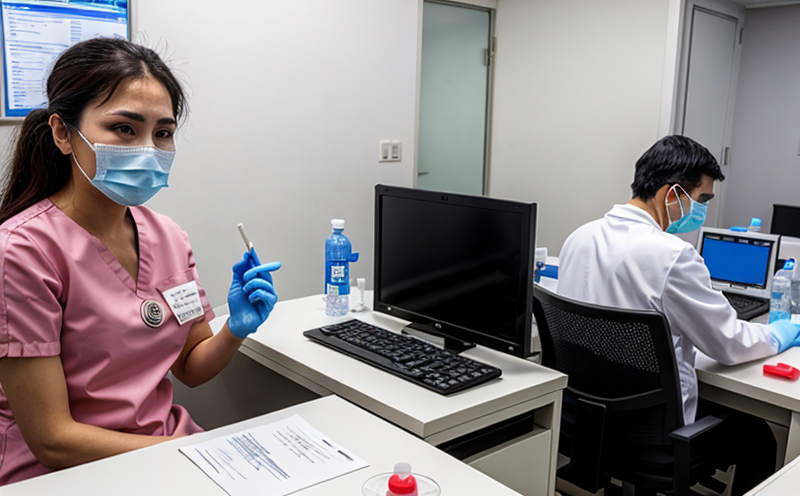Equine Infectious Anemia Virus (EIAV) Serology Testing
The Equine Infectious Anemia Virus (EIAV) is a retrovirus that belongs to the genus Gammaretrovirus. This virus can cause severe anemia and immunosuppression in horses, leading to significant health risks. EIAV serology testing plays a critical role in diagnosing the infection by detecting antibodies produced by the horse's immune system against the virus.
Equine Infectious Anemia Virus serology testing involves several steps that ensure accurate and reliable results. Specimen collection typically includes blood samples from horses suspected of being infected with EIAV. The sample is then processed to isolate serum, which contains antibodies for analysis.
The most commonly used test methods for EIAV are the ELISA (Enzyme-Linked Immunosorbent Assay) and Coggins Test. These tests detect antigens or antibodies specific to EIAV. The ELISA method is particularly sensitive and can identify even small quantities of virus-specific antibodies, making it a preferred choice for diagnostic laboratories.
The Coggins Test, named after its inventor Dr. Stan Coggins, has been widely used in the equine industry since the 1970s. It detects antibodies against EIAV and is a simple, reliable test that helps prevent the spread of the virus among horses. In some regions, the Coggins Test is required for interstate travel to ensure horse health.
For accurate results, it is essential to follow standardized procedures closely. The specimen should be collected in a clean, dry container and transported under appropriate conditions to avoid contamination or degradation. Proper handling ensures that the test yields valid results, which are crucial for diagnosing EIAV infection accurately.
The testing process involves several critical steps:
- Specimen collection: Blood samples from horses suspected of being infected with EIAV.
- Serum isolation: Extraction of serum from the blood sample to ensure only antibodies are tested.
- Test method selection: Choice between ELISA and Coggins Test based on specific requirements or regional regulations.
- Instrumentation: Use of specialized equipment such as spectrophotometers for accurate measurement in ELISA tests.
- Reporting: Submission of results to veterinarians, horse owners, or regulatory bodies as needed.
The accuracy and reliability of EIAV serology testing are paramount. Compliance with international standards like ISO 15189 ensures that the laboratory adheres to high-quality practices in specimen handling, testing methods, and reporting. By following these protocols, laboratories can provide accurate results that contribute to the overall health and welfare of horses.
Understanding the significance of EIAV serology testing also involves recognizing its broader implications for equine health management. Regular testing helps identify infected horses early, enabling prompt treatment and preventing further spread of the virus. This proactive approach is crucial in managing outbreaks and ensuring the well-being of the equine population.
Applied Standards
| Standard Name | Description |
|---|---|
| ISO 15189: Medical laboratories – Requirements for quality and competence | This standard sets the international requirements for medical laboratories to ensure they provide high-quality testing services. |
| American Association of Equine Practitioners (AAEP) Guidelines for Equine Infectious Anemia Virus Testing | These guidelines specify best practices and standards for diagnosing EIAV infections in horses, emphasizing the importance of accurate serology testing. |
The application of these standards ensures that all aspects of equine infectious anemia virus (EIAV) serology testing are conducted under controlled conditions, leading to reliable results. Laboratories adhering to such standards can provide confidence in the accuracy and consistency of their test outcomes.
Why Choose This Test
- EIAV serology tests offer high sensitivity and specificity for diagnosing equine infectious anemia virus infection.
- The tests help identify infected horses early, enabling prompt treatment and preventing further spread of the virus.
- Compliance with international standards ensures reliability and consistency in test results.
- Regular testing is crucial for managing outbreaks and ensuring the health of the equine population.
EIAV serology tests are essential tools in the diagnosis and management of equine infectious anemia. By choosing this test, laboratories can provide accurate and reliable results that contribute to the overall health and welfare of horses. The high sensitivity and specificity of these tests make them a cornerstone for effective disease control measures.
Environmental and Sustainability Contributions
- EIAV serology testing helps reduce the spread of equine infectious anemia virus, minimizing environmental impact by preventing infected horses from entering the population.
- The accurate identification and treatment of infected animals contribute to improved herd health, which can lead to reduced stress on resources and ecosystems.
- Compliance with international standards ensures efficient use of resources in testing processes, reducing waste and enhancing sustainability practices.
EIAV serology testing not only supports the health and welfare of horses but also contributes positively to environmental sustainability. By minimizing the spread of infectious diseases, these tests help preserve natural resources and support a healthier ecosystem for equines and their environment.





